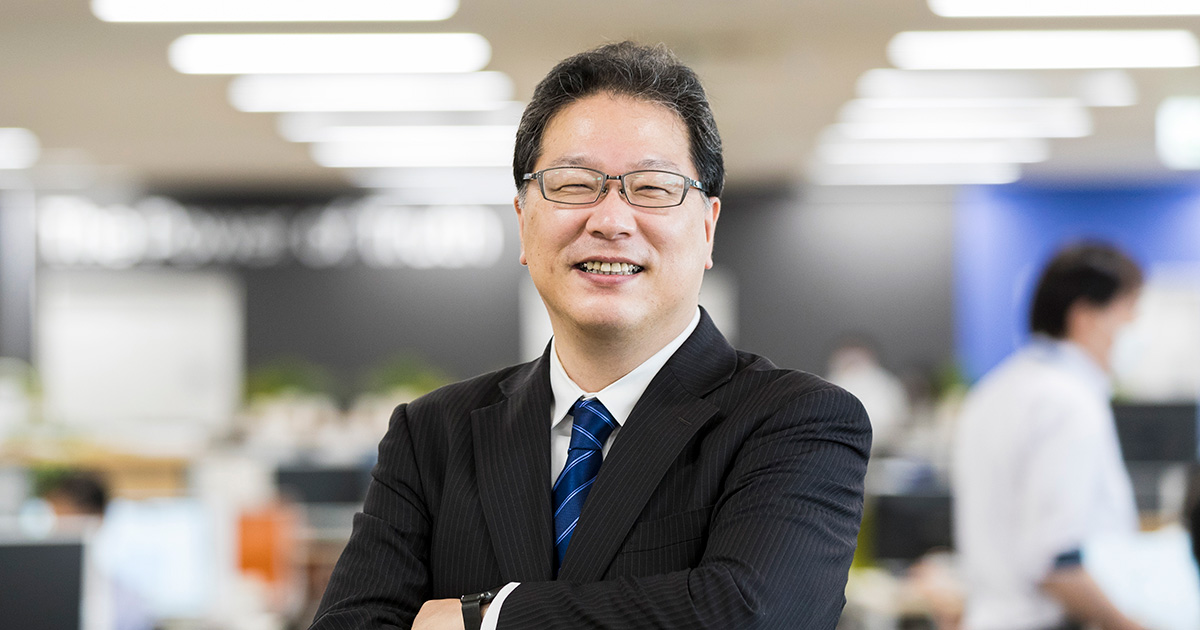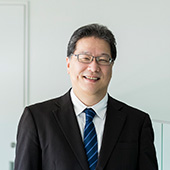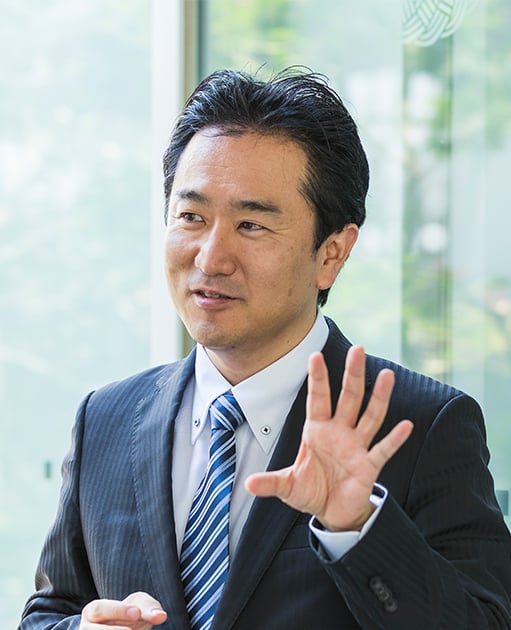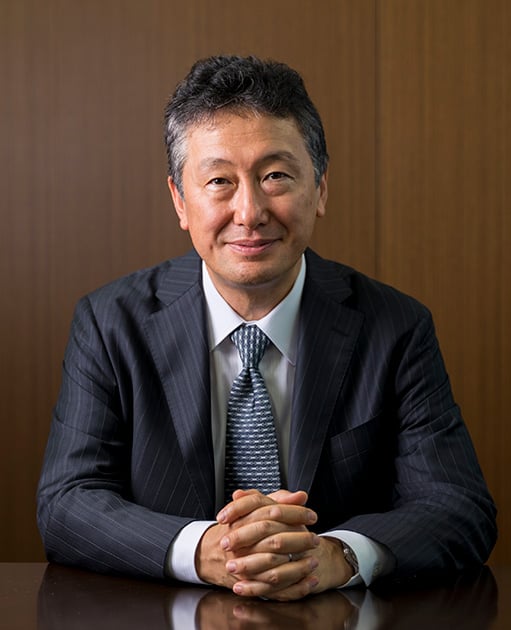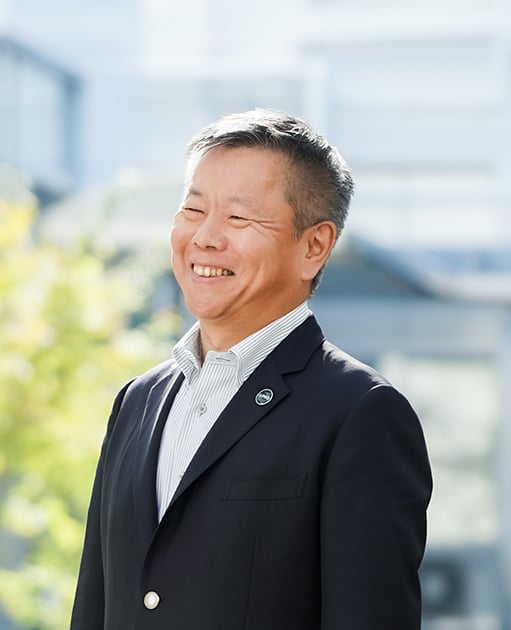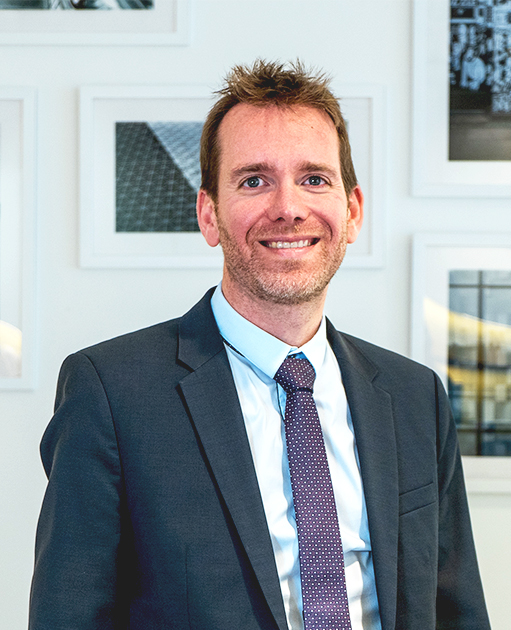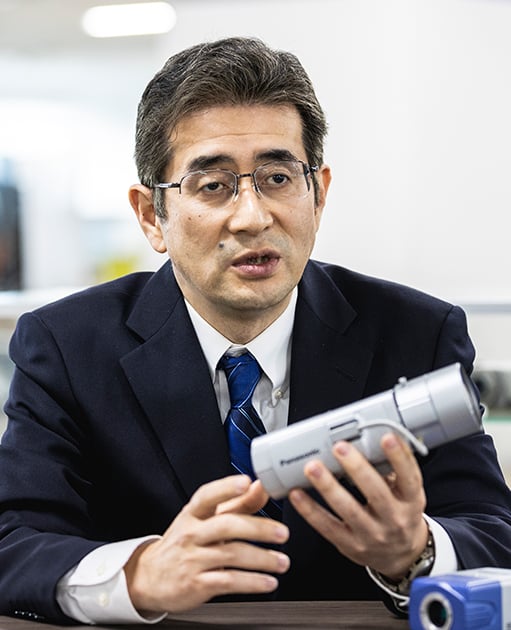With the increasing importance of sensing devices worldwide, Panasonic i-PRO Sensing Solutions set sail on a new ocean in October 2019. Representative director, president, and COO Shohei Ozaki took the helm of the company with a management sense he cultivated through diverse experience gained in various gemba (scenes). Here we talk about the "evolution" that Ozaki is aiming for as an organization, the "strategy" that it should be pursuing both in Japan and overseas, and the "future" beyond i-PRO.
Developing management skills at Panasonic
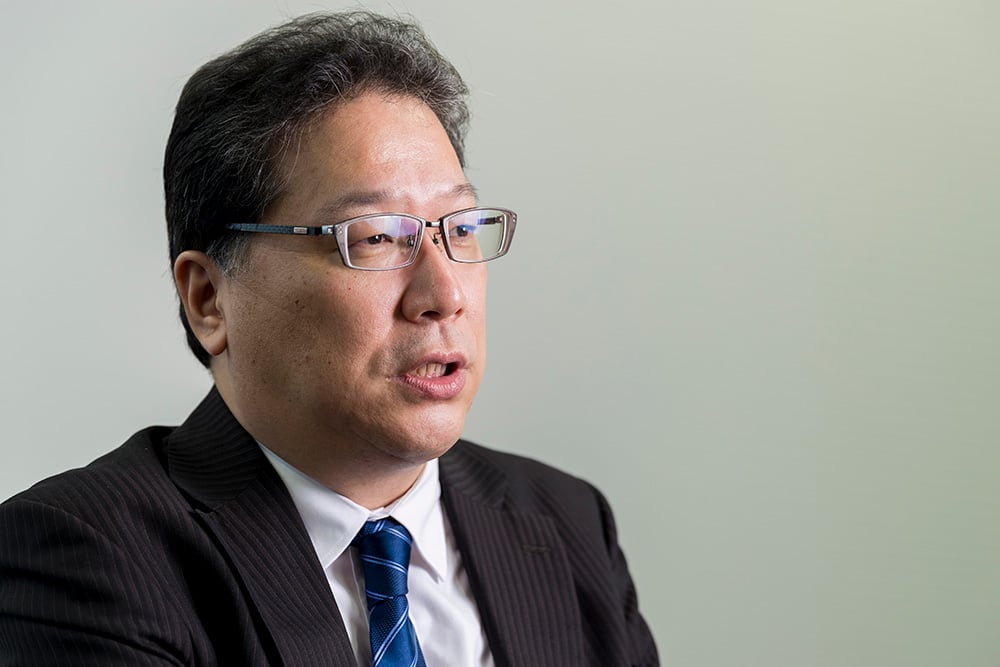
Q. It’s now been one year since the new company was founded. Have you settled into your role as director?
Not quite yet (laughs). My previous roles also had me acting from a manager’s perspective, so when I was with the Panasonic Group even after I became an executive manager there wasn’t that much of a difference from what I was doing previously. As I gained experience, my area of responsibility in project management grew. But being president is something else. To me, there’s a big difference between the role of an executive manager and that of a president. There are so many things you have to think about when you’re in charge of running a company. You have to ensure in a timely manner that every necessary aspect of the company is running properly, and quickly reform the internal workings of the company as required. Of course, I have to change myself, as well.
Q. I see that you were involved with developing systems for governmental organizations for several years. Is there anything in particular that you learned during this period?
When you’re an engineer, you do things like developing software and designing systems, but when the client is the government, you can’t get away with doing that alone. In addition to the technical side of things, you also have to look at things from a management perspective.
You have to think deeply about how to ensure the highest quality while realizing the client’s vision, and also optimize for the lowest cost. It also becomes important to have a medium-term strategy.For example, let's say you predict that you’ll receive a large bid in two years’ time. Then you have to ask, what kind of preparations do we have to make, what technical issues do we need to solve, which of our strengths should we emphasize, and so on. We planned our strategies taking a lot of things into consideration. As a result, this turned out to be a shortcut for optimizing our expenses.
Experiences like these still play a role in informing my decisions today.
“Bolder, more flexible” – Changes are also happening within the organization
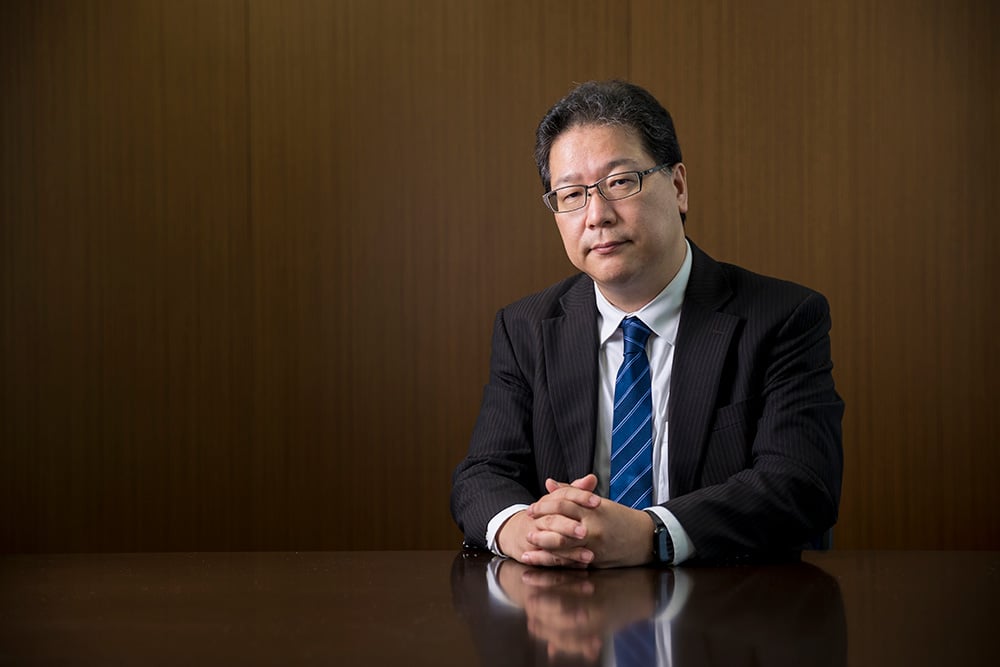
Q. Did anything major change when this department became an independent company?
If you’re part of a large corporate group, there are a lot of vectors all interacting with each other, so there are a few issues, like the long time taken to make strategic decisions, or the way scalability of investments is kept separate between functions. When the new company was founded, this gave us an opportunity to solve dilemmas like these, and operate the business in a more agile and nimble manner. In the future, I hope to evolve the company into a small, compact organization, which will enable us to create the optimal formation for operating one business.
Q. What do you think is the ideal organization for which a new company should strive?
When developing the new company’s corporate identity, we focused on three keywords. Those three words are “Flexible”, “Bold” and “Trusted”.
All the members of our company are really “sincere”. This is crucial. In addition, many of them are highly sensitive to risk; the type to always look before they leap. In that respect, we’ll need to gradually change our mindset though.
To develop our business more speedily in the future, we will need to be bolder and more flexible.
We’ll need something that large companies lack, a kind of “spirit of venture”.
The strategy for further growth in Japan and overseas
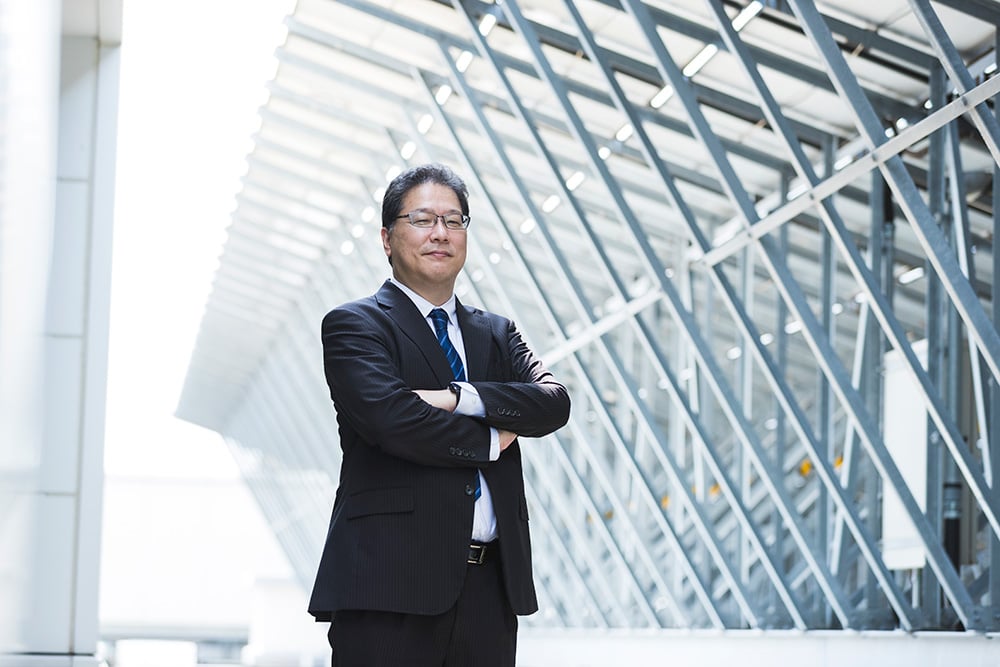
Q. How do you see the domestic market in Japan?
We have the highest market share in the domestic security camera market. This is thanks to my predecessors. However, foreign competitors are growing stronger and stronger each year. We will need to think of ways to defend our market share in the future. What's more, after taking another look at the domestic market today, it became clear to me that there are some things we weren’t able to do properly. Currently, we’re in the process of uncovering them and taking action on them.
Q. Looking at foreign markets, are there any countries you see as particularly important?
In terms of foreign markets, the main one we’re going after right now is the United States. When we founded our new company, we were able to create a formation in America where the development, manufacturing and sales departments were all one. As a result, we’re able to move forward with our business more quickly. In the U.S. security camera market, Chinese manufacturers have been shut out, and Western companies are in fierce competition with one another. It’s already a large market today, but it is likely to grow even more in the future.
Q. What’s the outlook for other countries and regions outside of the United States?
A big challenge we’re currently facing is the question of how to grow our market share in countries other than the United States. In Asian countries, Chinese manufacturers still reign supreme. We’re also not satisfied with our market share in the European Union. We’ll need to revisit our strategy in these areas and continue to update it.
Leading a manufacturing revival, and becoming a trusted company
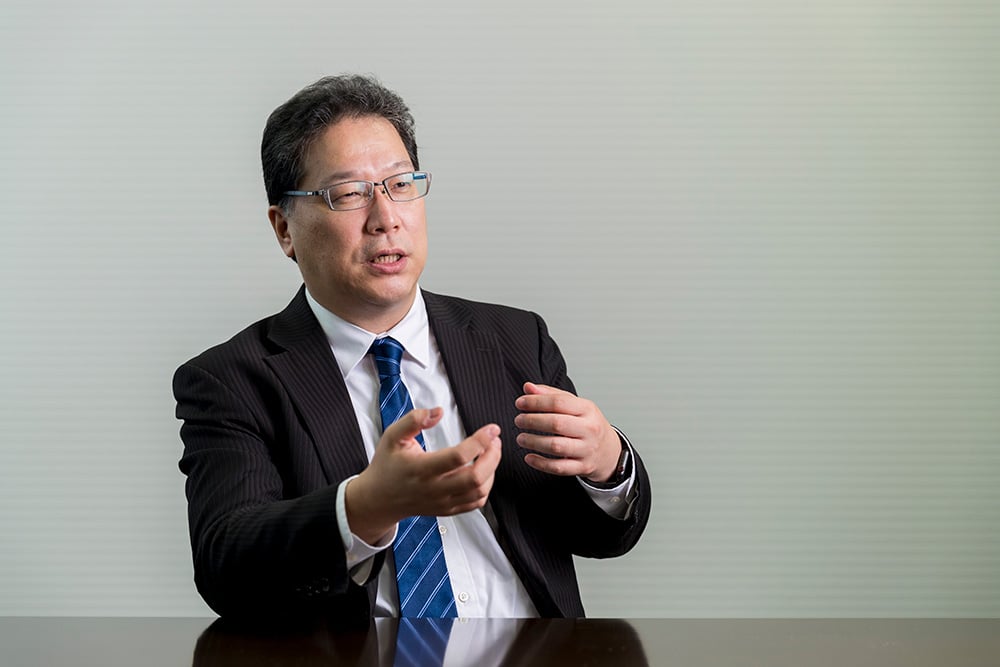
Q. What would you say is the identity of i-PRO, this newly born company?
The fact that we devote ourselves to manufacturing. While AI and image recognition technology continues to evolve, the demands placed on sensing devices are becoming more and more specific, and the range of solutions have begun to diverge. It is now very difficult for one business to provide all of them. The challenge for us then becomes, how can we be the first to offer the optimal sensing technology for these solutions?
Up until now, it was believed that the end users were our customers. But I’ve realized that our real customers are the solution vendors. To meet their needs, we need to increase our development speed.
However, this means that we might be being held back by the drive for self-sufficiency that leads us to produce everything ourselves. That’s why I want to increase the number of our partners who can develop software, AI applications, and other tools for us. And I want to collaborate with them on an equal footing. To do this, we have to be sincere. This sincerity is in our company’s DNA.
By then raising the quality of our products and our development speed, I want to make the company into a trusted manufacturer.
Q. They say that the economy is moving from manufacturing to services, so it’s quite surprising that you would deliberately go against the grain by focusing on manufacturing.
In the security industry, the market for manufacturing varies from customer to customer. In order to meet these demands widely, it is important to provide better manufacturing to customers who are promoting service businesses, rather than relying on our own initiative.
Originally the background behind this shift from manufacturing to services is that it’s become difficult to distinguish your products from those of other companies via their specifications or functions, and there was a risk of digital products becoming commodities. However, in the field of sensing devices, where our business is operating, there’s still a lot of room for technological advancement. For example, new advancements are constantly being made in AI, like putting it into microchips. What this means is that for the moment, the technology is not at risk of becoming a commodity.
I think that recently, the value of real things has finally rebounded, with new concepts like the IoT. Perhaps a new manufacturing boom is about to happen. When that happens, I believe that our company will grow in leaps and bounds.

